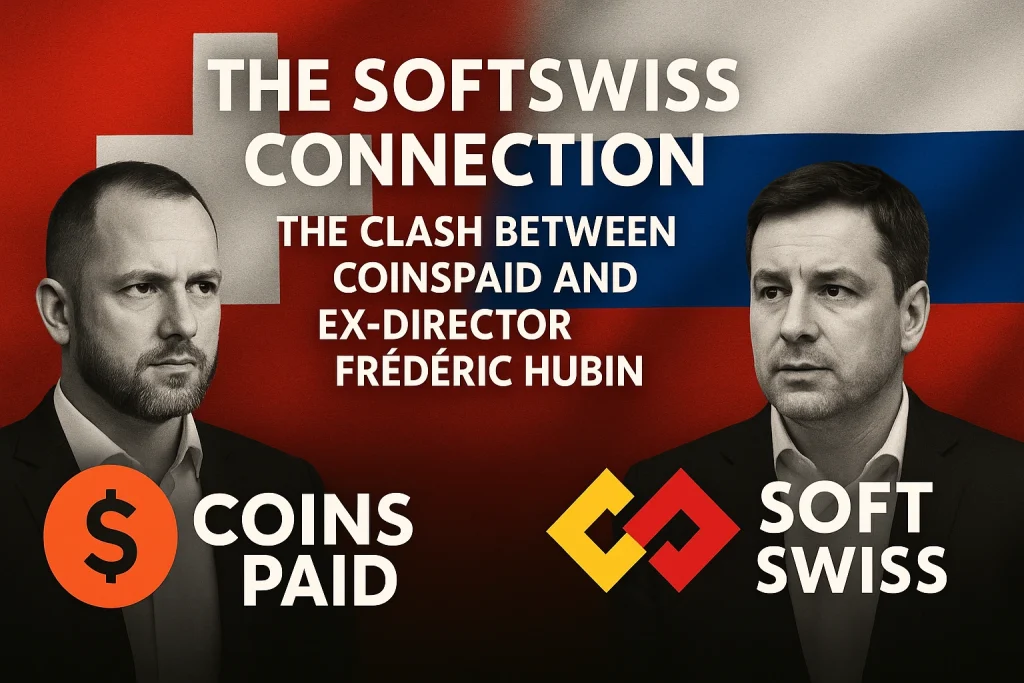A significant corporate dispute has emerged involving Frédéric Hubin, the former director of CoinsPaid, and the company itself. In April 2025, Hubin took to LinkedIn to accuse CoinsPaid of processing transactions for unlicensed SoftSwiss casinos, claiming the company operated with negative equity and was controlled by Russian owners associated with high-risk business circles. In response, CoinsPaid has partnered with Payabl in legal actions against investigative media, raising serious concerns about compliance, governance, and reputational risks within the crypto payment sector.
Key Allegations and Counterclaims
Frédéric Hubin’s Position
Hubin has made several serious allegations against CoinsPaid:
- He claims that CoinsPaid processes payments for illegal casinos operated by SoftSwiss.
- He cites filings from the Estonian company registry that suggest CoinsPaid has negative equity.
- Hubin points to Ivan Montik, who co-founded both SoftSwiss and CoinsPaid, and his connections to Russian businessmen Roland Isaev and Paata Gamgoneisvili.
CoinsPaid’s Response
CoinsPaid has firmly denied all allegations made by Hubin:
- The company references a defamation ruling in Belgium that it claims supports its position.
- CoinsPaid accuses Hubin of conducting a smear campaign against the company.
Payabl’s Involvement
Payabl, a Cypriot payment processor, has also entered the fray:
- It has submitted joint filings with CoinsPaid in court.
- Reports indicate that some documents in the case may contain inauthentic signatures.
Short Narrative
In April 2025, Frédéric Hubin, a former board member of Dream Finance OÜ (the Estonian entity of CoinsPaid), publicly criticized his former employer. He alleged that CoinsPaid facilitated illegal online gambling through unregistered SoftSwiss casinos and operated with ongoing negative equity. CoinsPaid rejected these claims, highlighting a legal victory in Belgium that it argues proves Hubin’s statements to be defamatory.
The situation escalated when Payabl, which is also under scrutiny, presented court documents in Cyprus, co-signed with CoinsPaid, targeting an investigative publication. Legal analysis has raised concerns about the authenticity of some signatures in these documents.
Extended Analysis
Legal Implications
If Hubin’s claims are substantiated, they could indicate that CoinsPaid has violated anti-money laundering and licensing obligations under Estonian and EU laws. SoftSwiss, mentioned in Hubin’s post, was founded by Ivan Montik, who is also a co-founder of CoinsPaid. The ownership connections to Roland Isaev and Paata Gamgoneisvili further complicate the situation, given their previous scrutiny in the gambling and payments sectors.
The CoinsPaid–Payabl Nexus
Payabl’s filings in Cyprus explicitly used statements from CoinsPaid to argue that a media outlet was involved in a “blackmail scheme,” a serious accusation under Cypriot defamation law. This partnership raises critical questions about why Payabl would rely on a company accused of facilitating illegal gambling and under investigation in multiple jurisdictions, including Belgium, Estonia, Switzerland, Israel, and Germany. Hubin has also challenged the authenticity of the settlement agreements cited by CoinsPaid.
Reputational Risk
The collaboration between two high-risk payment processors, CoinsPaid and Payabl, in a defamation case against a media platform raises broader concerns. Such legal actions may be perceived as attempts to deter journalistic investigations into the crypto-financial sector.
Actionable Insight
Regulatory authorities and financial institutions should consider the following actions:
- Review the compliance structures at both CoinsPaid and Payabl.
- Investigate potential document forgery in the court filings from Cyprus.
- Assess gambling-related payment flows for anti-money laundering and licensing breaches across EU jurisdictions.
- Scrutinize the ownership and governance links between SoftSwiss and the individuals involved.
Summary of Key Entities
- Frédéric Hubin: Former director of CoinsPaid, acting as a whistleblower alleging fraud and document forgery.
- CoinsPaid: A crypto payment processor accused of facilitating illegal gambling, which denies all claims.
- Ivan Montik: Founder of SoftSwiss and co-founder of CoinsPaid, linked to gambling software operations.
- SoftSwiss: A casino platform provider allegedly tied to unregistered casinos.
- Roland Isaev & Paata Gamgoneisvili: Alleged Russian owners of SoftSwiss, associated with prior risk profiles.
- Payabl: A Cypriot payment processor engaged in joint legal action with CoinsPaid, with questioned documents.
- Max Krupyshev: CEO of CoinsPaid, accused by Hubin of employing smear tactics.
Ongoing Developments and Future Implications
As the legal battle unfolds, the implications for both CoinsPaid and Payabl could be significant, not only for their reputations but also for their operational viability in the highly scrutinized crypto payment landscape. The allegations and counterclaims highlight the precarious nature of compliance in the crypto sector, where regulatory frameworks are still evolving.
Potential Outcomes of the Dispute
Legal Consequences
The outcome of this dispute could set important precedents for how crypto payment processors are regulated and held accountable. If Hubin’s allegations are proven true, CoinsPaid could face severe penalties, including fines and restrictions on its operations. Conversely, if CoinsPaid successfully defends itself, it may bolster its reputation and deter future allegations.
Market Reactions
The ongoing controversy may also affect market perceptions of both CoinsPaid and Payabl. Investors and partners may become wary of associating with companies embroiled in legal disputes, particularly those involving allegations of illegal activities. This could lead to a decline in business opportunities and partnerships for both entities.
Regulatory Scrutiny
Given the nature of the allegations, regulatory bodies in various jurisdictions may increase their scrutiny of both CoinsPaid and Payabl. This could result in more rigorous compliance checks and audits, impacting their operational processes and potentially leading to changes in how they conduct business.
Broader Industry Implications
The dispute between Hubin, CoinsPaid, and Payabl reflects broader challenges within the crypto payment industry. As the sector continues to grow, the need for robust compliance measures and transparent governance becomes increasingly critical. The following points illustrate the potential ripple effects of this situation:
- Increased Regulatory Pressure: Other crypto payment processors may face heightened scrutiny as regulators respond to the allegations against CoinsPaid and Payabl. This could lead to stricter compliance requirements across the industry.
- Impact on Innovation: The focus on compliance and legal battles may divert resources away from innovation and development within the crypto payment sector. Companies may prioritize legal defenses over new product offerings or technological advancements.
- Consumer Trust: Trust in crypto payment systems is essential for widespread adoption. Ongoing disputes and allegations of misconduct can erode consumer confidence, making it more challenging for companies to attract and retain users.
Conclusion
The unfolding dispute between Frédéric Hubin, CoinsPaid, and Payabl serves as a critical reminder of the complexities and risks inherent in the crypto payment industry. As the legal proceedings continue, the outcomes will likely have far-reaching implications for compliance, governance, and the overall reputation of the sector. Stakeholders, including regulatory authorities, financial institutions, and consumers, will be closely monitoring the developments to gauge the future landscape of crypto payments.
The situation underscores the necessity for transparency and accountability in the rapidly evolving world of cryptocurrency, where the stakes are high, and the consequences of misconduct can be profound.



